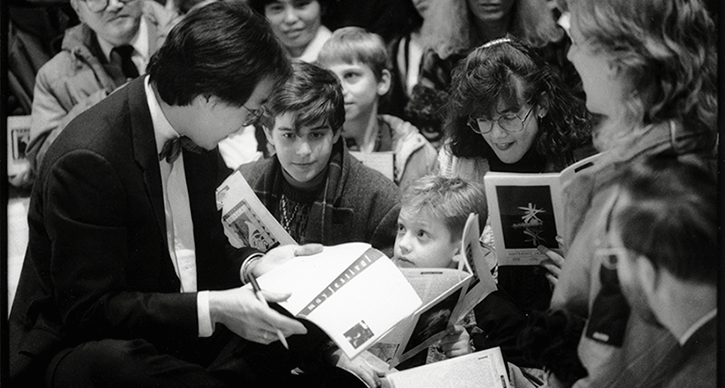Yo-Yo Ma and the Silk Road Project: Musical Journeys

Photo: Yo-Yo Ma sits on the stage and autographs programs for students at Hill Auditorium in 1991.
With their March 16 concert at Hill Auditorium, Yo-Yo Ma and the Silk Road ensemble receive the 2013 UMS Distinguished Artists Award, and Yo-Yo Ma is a name known to almost anyone even casually acquainted with classical instrumental music. Sheer longevity has helped Ma to this point—his performing career began in 1961, at the age of six, and he has an instinct for connecting with general audiences that was second nature to the great virtuosi of the past but isn’t seen so much anymore.
Yet this Parisian-born, Chinese-descended, and for all that thoroughly American cellist has reached a level beyond mere popularity. “Distinguished artist” covers it pretty well. How did he get here? Few would nominate him on purely technical grounds; he does everything well that he needs to, but it’s a keen ear that can identify his playing from its sound alone. Audiences are quick to respond to his personal warmth, and no one should discount that. But it’s a quality he shares with many other musicians.
Most artists follow trends, a few even set them. But rare indeed are the ones like Ma for whom each individual concert is part of a larger, even a lifelong utterance. Yo-Yo Ma’s music brings ideas from a hundred years ago, and it explores others that are absolutely new, and in which he is indeed a pioneer. His music-making carries with it history of ideas, and in this lies its enduring appeal.
Something entirely new in the history of concert music
The Silk Road Project, an incarnation of which appears at UMS’s March 16 special event, was founded in 1998. It’s something entirely new in the history of concert music: not really an ensemble, for as an ensemble it is always changing. Instead, it’s an organization, a framework for collaboration, an ongoing series of programs and educational enterprises—in a word, an idea.
The Silk Road, which also had an important maritime component, was a network of trade routes connecting Asia, the Mediterranean, and Africa from antiquity until the Renaissance era. It was a conduit for much more than silk and other luxury goods, bringing, for a start, Buddhism to China, ancient Greek art to Central Asia and points east, and Indian religions and finally Islam to Indonesia. Why do statues of the Buddha look Greek? The artistic ramifications of these developments, stretching over more than a millennium, are countless, and each new Silk Road Project recording or performance brings the feeling that the surface has only been scratched.

Image courtesy of UNESCO.org.
The Silk Road Project is indeed something new, yet it’s something old as well. It’s difficult for modern audiences to put themselves in the place of those in the late nineteenth century, when lines between classical and popular music were not so firmly drawn, and when a virtuoso was often a player who brought a whiff of exotic lands. With the Silk Road Project, Yo-Yo Ma is in part reflecting on his own heritage and on the many cultures in its orbit. Classical music has always relied on the physical presence of the virtuoso to keep it in touch with the music of the wider world and avoid losing itself in insular delusions of linear progress, and looked at in one way, Ma is the heir to a musician like violinist Pablo de Sarasate, whose repertory traced a semicircle from Spain to Venice Eastern Europe around classical music’s increasingly Germanic core.
Sarasate performs:
Yet, for all that, Yo-Yo Ma is a product of the idealistic middle twentieth century, when classical music seemed able to spread a kind of enlightenment. He made his name not with Asian music but with Bach’s suites for solo cello, following the mold of an artist whose influence on him has been a bit obscured by the fact that their styles are different: Pablo Casals. Ma played under the 90-year-old Casals in the Marlboro Festival Orchestra in Vermont, and Casals went on, at 95, to write a Hymn to the United Nations (with text by W.H. Auden), and Yo-Yo Ma numbers among his honors that of official United Nations Messenger of Peace.
A Hymn to the United Nations:
The Silk Road Project rests on this foundation of idealism. It has been the major artistic decision of Yo-Yo Ma’s middle age, and it weaves together strands of culture from wide ranges of space and time. Each Silk Road Ensemble concert brings something of exotic cultures, of classical idealism, and of new world fusions, yet each one is different. As an explorer of world music Ma is unusual and fresh; as a visionary who sees how world music relates to the classical tradition and its capacity for historical reflection, he is a unique treasure. He has a keen eye for talent, a healthy disregard for genre, and a willingness to try new things that is nothing short of marvelous in the later stages of a classical career. Distinguished, indeed.






